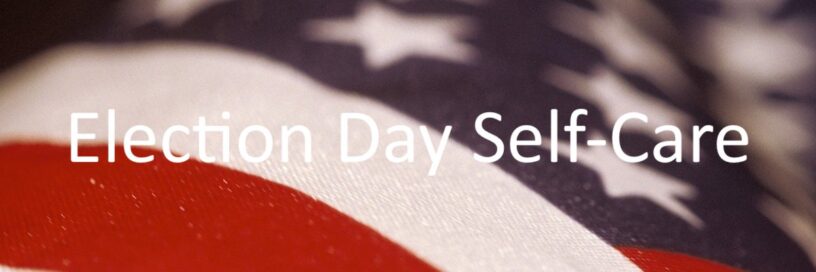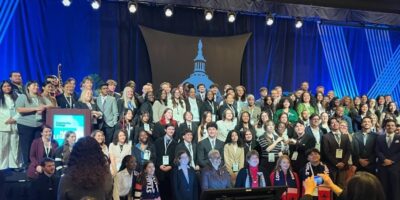Dear Students, Faculty, Staff, and All Members of the Northern Essex Community College Community:
This Tuesday, November 3, is election day in America.
It will be the 59th time in our nation’s history when we have cast our votes for a president, as well as other national, state, and local elected leaders.
For many Americans, and certainly many college students, this election, more than any other in their lifetime, feels more anxious, angry, and even fraught with danger.
Without doubt, 2020 has been a difficult year for everyone, as we have grappled with a global pandemic, a devastating economic recession, a reckoning with America’s history of systemic racism, and the separation and sometimes loss of family and friends.
On top of these enormous challenges is a rancorous race for the presidency that has sharply divided the nation.
Beyond the stark policy differences and promises of our political parties there is widespread concern about the effects of gerrymandering, ballot fraud, possible voter suppression, “fake news,” potential court interference, and of course, the growing “third wave” of COVID-19.
All together, these fears and more are leading many to doubt the integrity and safety of the election process itself, to wonder when we may know the results, and to worry about the reactions that may follow.
It’s a lot.
So, let me encourage you to please take a breath, relax a moment, and consider these five steps you can follow to make the next several days (or, more likely, weeks) feel a little less chaotic, and a lot more purposeful:
1. Be Informed
It’s human nature to fear the unknown.
The more you know about the people, policies, and processes that matter most to you, the less anxious and frustrated you may be, and the more confident you can become listening to others and participating in the election process.
Many people are already sure about these things, and millions across the country have already cast their ballots.
If you are not, that’s OK—there is still time.
Who are the candidates and what are the specific issues in your voter district? Try researching the people running for office and be sure you understand each issue you are hearing about and voting on.
Here are a few nonpartisan web sites that present helpful information without making endorsements. Learn all you can, and make your own decision:
- Ballotpedia: Compare candidates and issues and look at sample ballots that are specific to your zip code.
- League of Women Voters of Massachusetts: Provides information on how to vote, compares candidates and issues.
- Best Colleges Student Voting Guide: Explores major issues with an emphasis on how they affect students.
2. Avoid (and Don’t Spread) Misinformation
Although it seems to be all around us, like one more monstrous calamity of 2020, misinformation, or “fake news,” is not new.
In fact, as Smithsonian Magazine reported in “The Age-Old Problem of ‘Fake News,’” more than two-hundred years ago President John Adams wrote, “There has been more new error propagated by the press in the last ten years than in an hundred years before 1798.”
And that was WAY before Facebook and Twitter.
You can do your part to avoid misinformation by following an old Russian proverb made popular by President Ronald Reagan during nuclear disarmament talks with the former Soviet Union in the 1980’s: “Doveryai, no proveryai” (“Trust, but verify.”)
Run across something outrageously scandalous posted by a friend in your Facebook feed? Just receive an email chain forwarded by a rumor-loving family member?
OK. Give that friend or family member the benefit of a doubt if you really feel like it. Trust, but verify by looking up the scandal, rumor, or racy report on one of these reputable, non-partisan web sites:
- FactCheck.org: A project of the Annenberg Public Policy Center that “Monitor(s) the factual accuracy of what is said by major U.S. political players.”
- PolitiFact.com: Fact-checking journalism with a rigorous “Truth-O-Meter” since 2007.
- Snopes.com: One of my personal favorites. The “Oldest and largest fact-checking site on the Internet” (launched in 1994, when AOL was still saying, “You’ve got mail!”) Not just about politics. You can also look up whether racoons really did break into a bank, and other hot topics.
- PunditFact: “Dedicated to checking the accuracy of claims by pundits, columnists, bloggers, political analysts, the hosts and guests of talk shows, and other members of the media.”
- ProPublica. An independent, nonprofit newsroom that has won several Pulitzer Prizes. ProPublica produces investigative journalism in the public interest.
You can also stop to consider your own “confirmation bias” (are you reading something that you really want to believe, whether it is true or not?); look for other reputable sources that confirm or contradict what you you’ve run across; or talk to others—especially those who may not see things the way you do—to test how real this new information might be.
However you choose to check it out, if you do discover that something you have found or been sent is not accurate or, worse, has been created to intentionally spread false information, don’t spread it further.
Think before you share, forward, like, retweet, or otherwise repeat something that just isn’t true.
3. Defend–and Put Your Faith in–Our Democracy
The United States of America has the oldest continuous democracy in the world.
When our democracy is threatened by false allegations intentionally meant to undermine voter confidence; or encouragement toward election-related acts of violence, then it is shaken.
The peaceful transition of power is a hallmark of our American democracy—one of the most important traditions we have that sets us apart from dictatorships and failed democracies elsewhere.
When the prospect of that peaceful transition after an election is in doubt, then our democracy is rattled to its very core.
None of us should support acts like these if they occur.
And, we should keep in mind that, unsettling and outrageous as some recent events may seem to be, our country and its democratic system has weathered such crises before in our 232-year election history, and eventually emerged stronger for it.
The Duel at Dawn
In 1800, the two “Democratic-Republican” candidates (as their party was known then), Thomas Jefferson and Aaron Burr, handily defeated the Federalist candidate, John Adams, but tied on electoral votes, with 73 each. According to the Constitution, this meant that the Federalist-controlled House of Representatives had to decide the election which, after several votes without a clear winner, they finally did when Alexander Hamilton convinced his Federalist friends that Jefferson was the safer choice.
Of course, Hamilton’s lobbying against Burr was part of a long-running feud between the two men and their political parties that eventually led to Burr shooting and killing Hamilton in a duel in 1804 (and, of course, to one of the most popular Broadway musicals of all time).
The Tiebreaker
Democrat Samuel Tilden beat Republican Rutherford Hayes in the election of 1876. When the votes were tallied, Tilden had 250,000 more popular votes out of just over eight million cast, and he was ahead in the electoral college by 19 votes.
The problem was, he still didn’t have the 185 votes he needed to carry the electoral college. Four states—Florida (sound familiar?), South Carolina, Louisiana, and Oregon were disputing the results, and accusing each other of (wait for it): fraud.
The two political parties decided to create a commission consisting of seven Republicans, seven Democrats, and an Independent to sort it all out. But at the last minute, the Independent, Supreme Court Justice David Davis, was tapped by the Illinois Legislature to serve as a U.S. Senator. He was replaced by Republican Joseph Bradley, who cast every vote for his party and for Hayes, making Hayes the second president (after John Quincy Adams in 1824) to lose the popular vote, but gain the presidency.
Why did the Democrats allow this to happen? In the Reconstruction years following the Civil War, federal troops occupied southern states to enforce civil rights that had been legally extended to Black citizens. This backroom, unwritten “Compromise of 1877” handed the White House to the Republicans, removed federal troops from Democratic states in the south, effectively ended Reconstruction, and set back the cause of civil rights for Black Americans by decades.
The “Hanging Chads”
Twenty years ago, in one of the closest elections in U.S. history, Republican George W. Bush narrowly lost the popular vote to Democrat Al Gore by 543,895 (out of over 100 million votes cast), but managed to win the presidency by one electoral vote that put him over the top, thanks to the United States Supreme Court.
By late on election night, November 7, 2000, the race was still too close to call, though some newspapers and television networks, relying mostly on contradictory exit polls, tried naming either Bush or Gore the winner.
At one point, candidate Gore even called candidate Bush to concede, then retracted his concession when it appeared the race was even closer than Gore’s staff thought it was.
Eventually, everything came down to Florida, where Bush seemed to have a lead of a few hundred votes, though during a mandatory statewide recount, there was disagreement over how to tally “hanging chads” (paper ballots that were not completely punched), “pregnant chads” (paper ballots that were “dimpled” but not pierced), “overvotes,” “undervotes,” and a number of other odd ballot disfigurements that usually wouldn’t matter.
Except in Florida in the first national election of the 21st century.
Finally, after weeks of legal battles, the U.S. Supreme Court, in a controversial 5-4 decision, ruled that yet another recount of ballots in Florida could not occur in time to meet the December 18 deadline to certify the state’s electors. In the end, Gore received 266 electoral votes, while Florida’s votes gave Bush 271, a single vote more than he needed to win.
We do not want to repeat any of these experiences in 2020, but whatever happens it will be important to keep our faith and our support in a democracy that has withstood the test of time—and duels, tiebreakers, and hanging chads.
4. Vote
As Florida clearly demonstrated in 2000: Every vote matters.
Whatever your party, issue, or candidate, the best way to express yourself, and to perhaps feel better in the process, is to actually vote.
In Massachusetts, you can vote in person on election day, you can vote early in person, or you can vote by mail.
- If you plan to vote in person on election day, Tuesday, November 3, you can find your local polling place here.
- If you plan to vote early in person, here is a list of Early Voting Dates and Locations near you.
- If you plan to vote by mail, the deadline to request a vote by mail ballot has already passed. If you requested and received your vote by mail ballot already, in order to be counted, your ballot must be postmarked by November 3 and received by your local election official no later than 5 p.m. on November 6. The U.S. Postal Service recommends allowing up to 7 days for ballot delivery, so today is the day to put that ballot in the mailbox.
In New Hampshire, you can vote in person on election day, or you can vote early by mail with an absentee ballot, however, the deadline has passed for requesting an absentee ballot.
New Hampshire does not offer early in-person voting, so if you have not already received and returned your absentee ballot, and plan to vote on in person on election day, you can find your local polling place here.
5. Take Care of Yourself and Others
Physical and mental health are always important—and they are even more vital during stressful times like these.
It is quite likely that we will not know the results of the national election on Tuesday—or perhaps for several weeks afterward.
It is possible that the results will be contested in one way or another, as they have been several times in American history.
Prepare yourself for that possibility now, and take care of yourself and others:
- Take a break: Turn off the TV, put down your phone, and ignore social media for a while when it starts to feel overwhelming.
- Exercise: Take a walk or a run, ride your bike, do some yoga—whatever gets your body moving, your heart pumping, and oxygen flowing.
- Enjoy a Hobby: Read a book, knit a scarf, paint a portrait, tile your bathroom, walk your dog, tend your plants—something that keeps your hands and your head joyfully engaged (and blissfully distracted).
- Limit political conversations with loved ones: Someone expressing blatant racist views or advocating violence may need to be avoided, confronted, or reported; but most political disagreements within families or friendships are not that severe. You may have ideological differences with someone you otherwise care deeply about, and the best way to care for yourself, that person, and the relationship may be to limit your political conversation and find other ways of spending time together.
Finally, if you’d like to talk to someone about any of these steps, please know there are resources at NECC that you can turn to:
If you have questions about voting and/or you have an interest in getting involved in politics or your community, please contact the Civic Engagement Office by emailing Janel D’Agata-Lynch at jdagatalynch@necc.mass.edu or call/text 978-361-0977.
If you are a student interested in talking about election and other political issues, consider joining the Global Politics Club, which meets on Thursdays at 12:30PM via Zoom. If interested, please email Professor Stephen Russell at srussell@necc.mass.edu.
If you are experiencing stress or anxiety and would like support, please contact NECC’s Counseling and Psychological Services at counseling@necc.mass.edu or by calling 978-556-3730. Free counseling is available to all current NECC students.
2020 has thrown a lot at us, and the students, faculty, and staff of Northern Essex Community College have responded with amazing strength and caring for one another.
Our college is a strong academic community.
Our nation is a strong democracy.
We will endure—together.






